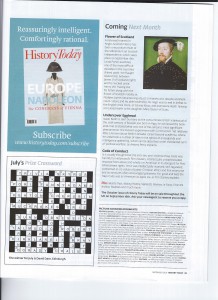When I was in my early twenties, I read a book titled something like ‘Why Darwin Is Wrong’. It wasn’t a creationist text, but a popular science-based analysis. I can’t find the volume on abebooks (which doesn’t appear to list anything before 1981), but I recall quite clearly two of its major objections to Darwinian thinking, so far as the author understood it. One, that the notion of ‘The Survival of the Fittest’ (which was actually coined by Herbert Spencer to describe Darwin’s natural selection) was tautological, and thus meaningless, since what was ‘survival’ but another way of saying that an animal was ’fit’? Two, that if the energies that contributed to survival took place after the animal had passed on its genetic material to its offspring, there would be no mechanism by which more adaptive traits would endure in the species.
I thought at the time that these points had merit, yet I was not completely discouraged from accepting that natural selection was the most plausible explanation for evolution, even though the exact mechanisms by which it occurred were still somewhat mysterious. I was, however, dismayed by another misconception, namely the way that the Theory of Evolution was frequently misrepresented as something purposeful by even the most knowledgeable of experts. I can recall the great David Attenborough, in Life on Earth, explaining certain phenomena in terms such as: “Thus, in order to survive, the bats had to develop radar.” This notion of purpose in Evolution is obviously nonsensical, and I have occasionally had to write to the Science Editor of the New York Times to point out where their journalists mistakenly ascribe this sense of an objective to adaptive changes. After all, did certain winged birds develop their flightlessness in order to make their life less hazardous? And what was the timescale according to which such adaptive changes worked? How long would it take for various initiatives to fail or succeed before the lack of ‘fitness’ wiped out the species? At the same time, as Jonathan Weiner’s The Beak of the Finch showed, describing the researches of Peter and Rosemary Grant on the Galapagos, small changes in the dimensions of finches’ beaks could rapidly take place in the light of changing climatic conditions and food supply.
Then Richard Dawkins’s Selfish Gene came along and changed everything, showing that the gene, not the individual organism (as Darwin believed) was the unit of natural selection. I have enjoyed Dawkins’s books since, although I found his first volume of autobiography, An Appetite for Wonder, rather scrappy and chippy. Now I have just finished his sequel, Brief Candle in the Dark. This is a new Dawkins. I think his PR firm must advised him not to be so offensive and controversial, because he positively oozes congeniality, and is nice about nearly everybody, and not nearly as scathing about religion as he used to be. (There must be a social meme in such superstitions that aids the survival of certain groups, a sad but unavoidable truth.) He also turns out to have almost as many friends as did Denis Healey or Lord Weidenfeld, and appears at times unbearably smug. As a curmudgeon myself, maybe I preferred the traditional Dawkins.
He has some fascinating new insights about the evolutionary process. I was interested to see what he had to say about the hot topic of epigenetics (defined in Chambers as the ‘gradual production and organisation of parts’, which is the study of how gene behavior is affected by environmental factors), and how he contrasted it with preformationist thinking (i.e. that, in essence, a homunculus was inside every human embryo). It seemed to me lately that some neo-Lamarckians, interested in promoting the notion of the passing on of acquired characteristics, have latched on to the term of ‘epigenetics’ to assist their cause. A footnote (p 402) from Dawkins is worth citing in full: “Don’t by the way be confused by the fact that the word ‘epigenetics’ has recently been hijacked as a label for a fashionable and over-hyped idea that changes in gene expression (which of course happen all the time during the course of normal embryonic development, otherwise all cells of the body would be the same) can be passed on to future generations. Such transgenerational effects may occasionally happen and it’s a quite interesting, if rather rare, phenomenon. But it’s a shame that, in the popular press, the word ‘epigenetics’ is becoming misused as though cross-generational transmission was a part of the very definition of epigenetics, rather than a rare and interesting anomaly.” Thank you, Professor. Just what I was looking for.
In one area however, I wonder whether Dawkins has got it wrong. I recall, at about the same time that I read the book on Darwin, taking in another work that pointed out how quickly scientists make analogies between the human body and whatever the current state of technology is (i.e. a pump in the 17th c., a clock in the 18th , an engine in the 19th , a computer in the 20th ). I thought that it might have been Arthur Koestler in The Ghost in the Machine, but I can find no trace of it there, and in those pre-spreadsheet days I did not keep track of every book I read. No matter: I think the point is valid. And Dawkins falls into the same easy motion. On page 382, when discussing the possible source of language, he makes the claim that ‘the human brain must possess something equivalent to recursive subroutines’ (an ability for a computer program to call itself and then return to an outer version of itself), a feature he says exists in Algol 60, but not the original IBM Fortran language he used. Such a feature in human genes, which he calls ‘macro-mutation’ might have come about in a single mutation, and could have been responsible for the ability to create the phenomenon of language syntax. In reducing a complex organic process to a mechanical one, however, I believe Dawkins makes a categorical mistake. A computer program is only an artifact of the entity that he is describing, namely the human brain, which is a far more complex phenomenon than the strings of ones and zeroes that comprise a language compiler. His comparison is therefore merely crude reductionism.
But then Dawkins compounds his error. He goes on to write: “Computer languages either allow recursion or they don’t. There’s no such thing as half-recursion. It’s an all or nothing software trick. And once that trick has been implemented, hierarchically embedded syntax immediately becomes possible and capable of generating indefinitely extended sentences.” First of all, if it is a design feature, it is not a trick. The trick – if there were one – would be an inherent flaw in the software where recursion did not work properly all the time – either by faulty implementation, or by a deliberate clandestine approach that made aberrant decisions based on some external circumstance or internal control data. After all, we each one of us know now about the Volkswagen Emissions Control Software, which gave false readings when the engine was being tested under laboratory conditions. Similarly, the implementation of a compiler program that claimed to allow recession could disable the function, or cause it not to work properly, depending on, for the instance, the date or time of day, the machine environment, or the particular iteration or count of the software execution.
He thus fails to distinguish between the design statement for a compiler that allows recursion, and the instantiation of that design in code. Moreover, no software is a perfect implementation, which causes the analogy inevitably to stumble. And by hinting at the notion of design in computer languages (what he signifies as the ‘trick’), Dawkins inadvertently undermines his analogy, since that notion of an architect has no role to play in evolutionary development, natural selection being an essentially haphazard process. Too many of his metaphors (for example, the arms-race, p 340; or ‘if we think of natural selection as a sculptor’, p 359) contain this notion of design at work, and thus weaken his whole argument, since the congenial atheist would assuredly deny the role of any ‘Designer’ in the process of language evolution. While many of the mechanisms by which genetic change occurs are still mysterious, that does not mean they are mystical. Following up on this theme, Dawkins later goes on to praise Chomsky’s idea of the language-learning apparatus being genetically implanted in the brain – which also strikes me as a bogus concept, since so many languages have implementations of syntax that are utterly antithetical and incompatible with other schemes. This is the weakest part of Dawkins’s theorizing.
Still, it was all a stimulating and enjoyable read, if you can put up with Dawkins continually reminding you how clever and successful he has been.
P.S. The New York Times informed me, on November 25, that the Saeed Book Bank in Islamabad, Pakistan, sells a thousand copies of Dawkins’s atheist treatise ‘The God Delusion’ each year. Not many people know that.
New Commonplace entries appear here. (November 30, 2015)









